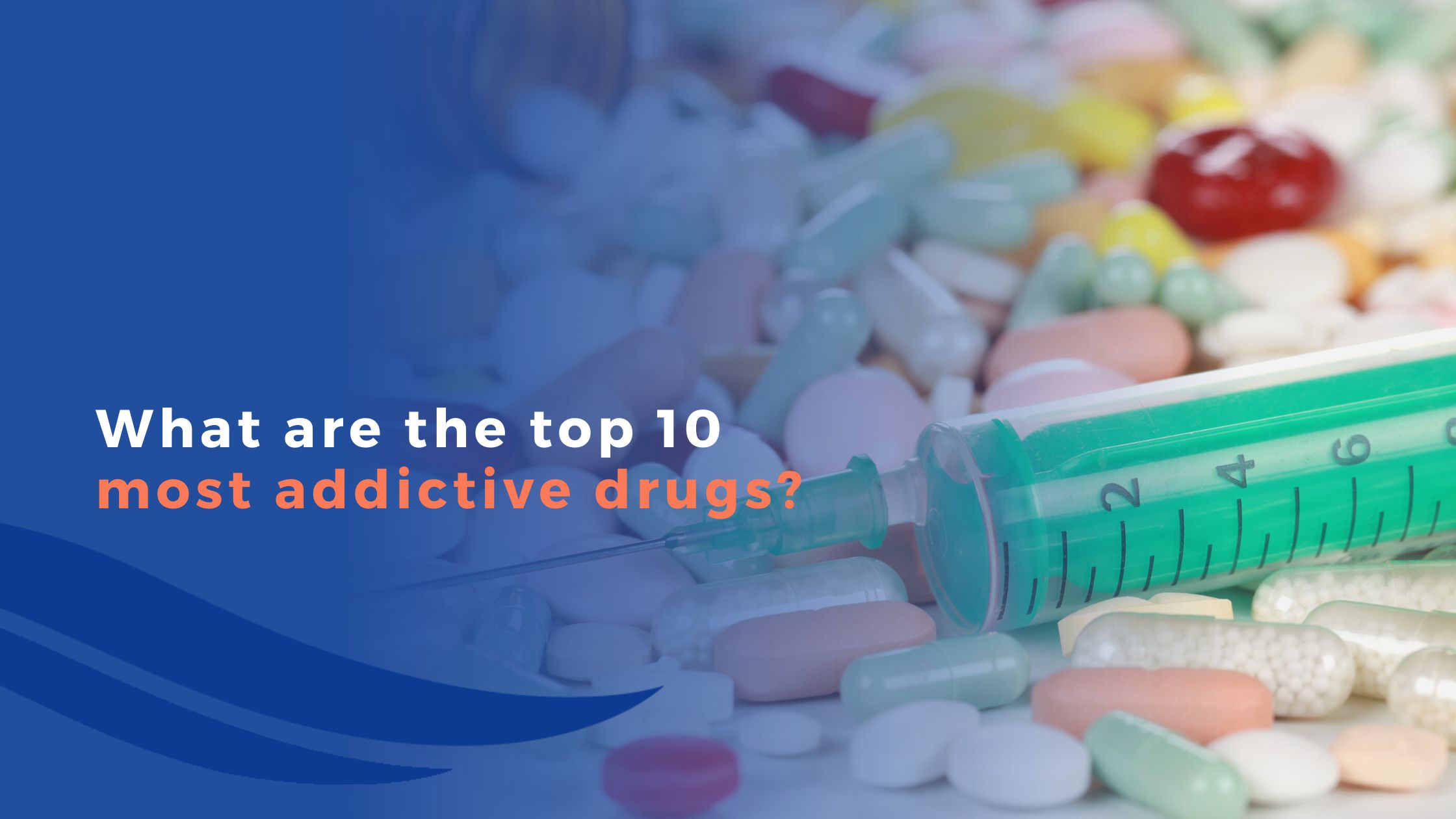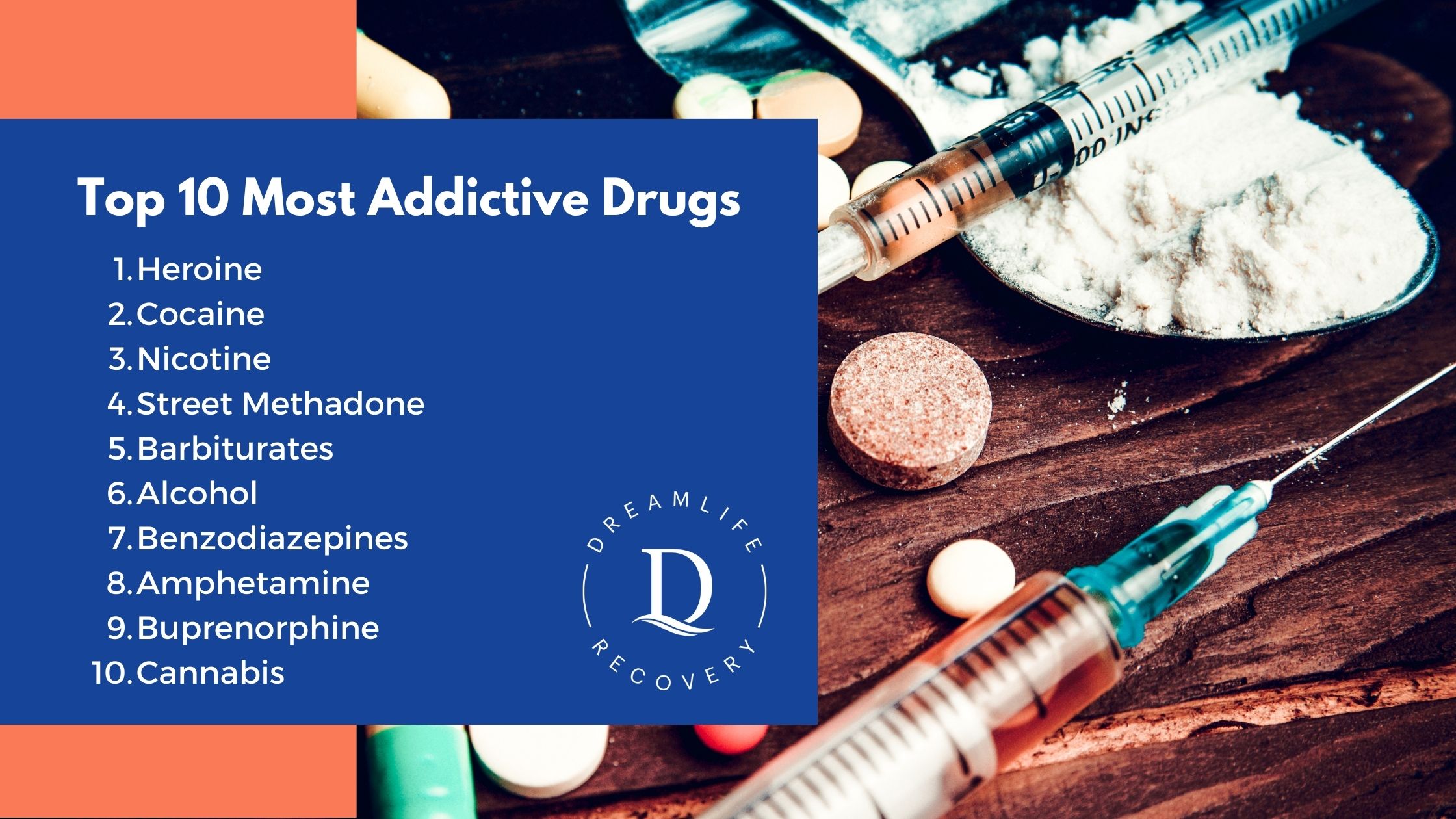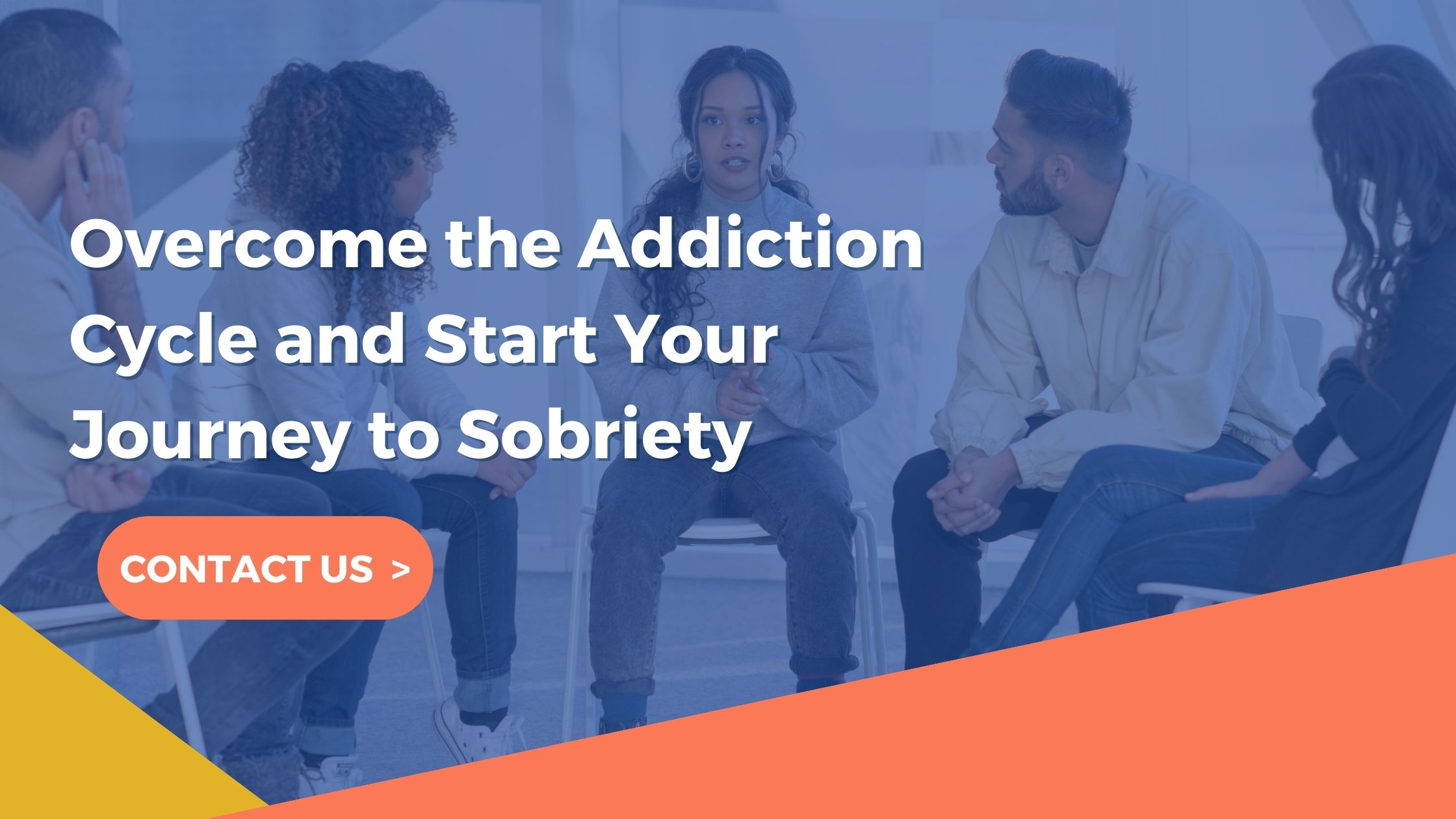What are the Top 10 Most Addictive Drugs?


Written By
DreamLife RecoveryA recent study published in the medical journal Lancet examined 20 drugs to identify the risks associated with each drug. Dependence, Physical harm, and social harms were the three categories into which the researchers split the factors. The top 10 most addictive drugs were determined using the data from the dependence category.
The three defining variables of dependency are physical dependence, psychological dependence, and pleasure intensity. Drug misuse is a prevalent problem with highly pleasurable substances because of the first high and the pleasure that follows. Physical dependence entails increased cravings, tolerance, and withdrawal symptoms, whereas psychological dependency is defined by persistent drug use, the dread of quitting, and negative consequences.


1. Heroine
Heroine is typically an opioid substance extracted from morphine. Its dependence component had the highest mean score (3.00). In the other two categories, it likewise received the top ratings. When using heroin by injection, smoking, or snorting, users experience a surge of euphoria. Heroin users quickly become used to the drug and must continually increase their dose to achieve the same results.
The unpleasant withdrawal effects encourage consumers to keep using the substance. These withdrawal symptoms include Severe muscle and bone pain, cold flashes, restlessness, vomiting, nausea, and involuntary leg movements. White matter loss in the brain, which impacts judgment and self-control, is one of the long-term repercussions of opioid addiction.
2. Cocaine
Cocaine came in second with a score of 2.39. The stimulant substance is extracted from coca leaves, and it’s often ingested by snorting. Drug dealers frequently combine it with additional ingredients like talcum powder, cornstarch, or flour to boost profits. Dealers also tend to lace cocaine with other narcotics like fentanyl, significantly increasing the risk of overdose.
Dopamine levels rise in the brain when cocaine is used frequently, which disrupts normal nerve cell transmission. As a result, users need to consume more dopamine to achieve the same level of happiness in their brains.
Depression, sleep problems like nightmares, insomnia, exhaustion, and sluggish thinking are typical cocaine withdrawal symptoms.
3. Nicotine
One of the primary reasons tobacco is used so widely throughout the world is that it is addictive. It may surprise some that the common and legal drug comes in third on this list with a dependence score of 2.21.
Those hooked on tobacco are lured by the highly addictive nicotine found in the leaves. The first sign of withdrawal is a strong yearning for tobacco, followed by agitation, difficulty sleeping, attention problems, and increased hunger.
About 34 million Americans smoke cigarettes, and the states with the highest numbers of tobacco smokers are Kentucky, West Virginia, and Louisiana. Utah and California have the lowest number of smokers.
4. Street Methadone
Although methadone is meant to treat addiction to narcotics and relieve severe pain, it is frequently misused. It ranked highly in psychological and physical dependency with a mean score of 2.08 but had a poor pleasure score. It can be purchased as a pill, oral solution, or liquid for injection.
The Department of Justice lists “Chocolate Chip Cookies, Amidone, Fizzies, Salvia, Maria, and Wafer” as some of its common street names. Withdrawal symptoms include anxiety, muscle trembling, vomiting, diarrhea, nausea, and cramping.
5. Barbiturates
Barbiturates are depressants with a mean dependency score of 2.01. From mild sedation to coma, they cause a broad spectrum of nervous system depression. They are often abused by injecting a liquid version into the user’s body or taking them as pills.
Barbiturates come in numerous forms, but Phenobarbital, Secobarbital, Amobarbital, Pentobarbital, and Tuinal are some of the most popular generic names. They induce a slight sense of exhilaration, lack of inhibition, anxiety, and tiredness. Seizures, vertigo, anxiety, sleeplessness, and psychosis are some of the withdrawal symptoms that can begin as early as the second day after stopping use. Barbiturates can cause hypothermia, circulatory collapse, and death if not addressed.
6. Alcohol
The most popular psychoactive substance in America is alcohol. Over 14 million persons currently have an alcohol consumption issue, while over 86% of adults have ingested alcohol at least once in their lifetime.
With a score of 1.93, alcohol ranks sixth among the top addicting drugs. Alcohol’s high pleasure score indicates that most individuals drink to unwind or celebrate.
However, the health risks linked to excessive drinking include alcohol poisoning, high blood pressure, stroke, memory impairments, melancholy, and anxiety. Alcohol withdrawal can result in delirium tremens, which can be fatal. Other symptoms include Tremors, seizures, and hallucinations.
7. Benzodiazepines
One of the most often prescribed drugs in the US, benzodiazepines (Benzos), helps ease anxiety and convulsions, relax muscles, and promote sleep. They have a 1.83 dependency score and are frequently abused due to their addictive qualities.
Benzos include medications like Valium, Xanax, and Restoril. Within one to four days of discontinuing benzos, users may experience insomnia and anxiety. During the next 10 to 14 days of discontinued use, you may experience panic attacks, sleep disturbances, dry retching and nausea, migraines, muscular soreness and stiffness, among other unpleasant symptoms. In some cases, benzo withdrawal can be lethal, necessitating professionally supervised detox.
8. Amphetamine
Amphetamines are stimulant medications used to treat Attention Deficit Hyperactivity Disorder (ADHD) and narcolepsy. With a dependency mean score of 1.67, they rank seventh on the list of top addicting drugs.
Illegally manufactured Amphetamines, such as meth, may occasionally be combined with sugar, caffeine, and a binding agent. Users may have a short-term energizing, self-assured, cheerful, and increased sex drive after using the substance.
Additionally, meth use also causes teeth grinding, dry mouth, and increased heart rate. Common amphetamine withdrawal symptoms include nightmares, agitation, aches, fatigue, melancholy, confusion, paranoia, and irritability. Usually, these withdrawal symptoms tend to disappear a month after stopping drug use.
9. Buprenorphine
Researchers have been working to develop drugs like buprenorphine to treat opioid addictions as the opioid epidemic continues to spread. It is meant to lessen cravings for opioids, reduce withdrawal symptoms, and inhibit the side effects of other opioids.
However, it still gives users—especially those without an opioid addiction—a happy and sedated experience. Buprenorphine’s mean score for dependency is 1.64 due to its resemblance to opioids.
10. Cannabis
Cannabis is among the most popular drugs in the U.S. People with multiple sclerosis, chronic pain, or nerve pain may relieve their discomfort using medicinal marijuana. According to Harvard Health, it can also treat glaucoma and decrease tremors associated with Parkinson’s disease. It has a score of 1.51 and comes in last, but it’s still very addictive.
Statistics show that 30% of marijuana users are dependent on the drug. Studies have also shown that people who begin using cannabis before their 18th birthday are more likely to develop a cannabis use disorder. Marijuana Withdrawal symptoms manifest as physical discomfort, a loss of appetite, problems with mood and sleep, cravings, and restlessness.
Struggling with Drug Addiction?
At DreamLife Recovery, we understand how difficult it is to take the first step on your journey toward recovery. Our experienced team of professionals are here to guide and support you through this process every step of the way. Our rehab facility in western Pennsylvania offers stunning natural surroundings and a supportive, caring atmosphere where you can focus on healing and building a foundation for long-term sobriety. Contact us at (855) 384-5808 today!







